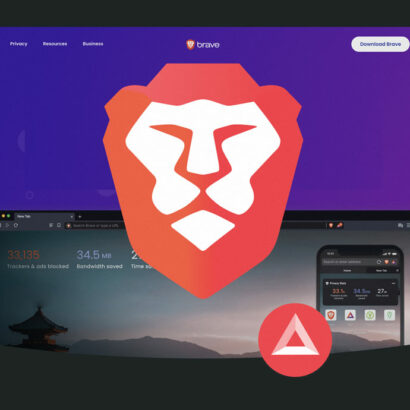The Big Idea is to Profit Off Your Own Data by Watching Targeted Videos and Collecting ASK as a Reward.
If Facebook and Google built multi-billion dollar empires through selling and monetizing user data, sometimes illegally. But since you’re the one creating the data, why aren’t you getting paid instead?
Data privacy and consent are emerging as important issues in the digitized world. People are getting sick and tired of seeing advertisements online, whether or not they’re targeted. This led to an uptake in privacy-oriented browsers, ad-blockers and search engines. Brave changed the game with their browser, allowing users to opt-into advertisements in exchange for earning the BAT cryptocurrency token.
ASK is a new cryptocurrency developed by Permission that would ask users to consent to targeted advertising. Then, the users would be rewarded in ASK token for viewing these targeted ads. Unlike Brave, Permission actually collects your data as part of its services to advertisers.
Since the ASK token is in the early phases of development, it could be a good opportunity to invest. Through the use of the ASK token, Permission hopes to provide benefits to people who sell their data. If you’re interested in this business model, you can visit Permission’s website and opt into ads or download the Google Chrome browser extension.
Does the ASK token have enough appeal and real-world applicability to drive mass adoption? Let’s explore this new altcoin as well as challenges and opportunities it is undertaking.
If there is a single piece of data on you, it is sold and sold and repackaged.
– Charles Silver, CEO Permission.io
Why Should I Sell My Data with Permission?
Get Paid in ASK to View Ads
Permission is hedging on the idea that consumers are happy to receive targeted ads if they’re asked in advance. This means that the consumer retains data ownership and control over which companies will be able to use their information. Additionally, it also means that companies will pay them for viewing ads, which sounds much more appealing than the current Clockwork Orange-esque system in which we are constantly subjected to ads.
What happens when someone reaches a website using ads that has the Permission Chrome extension? They are asked to grant permission for their engagement and data access. If they want to participate, they can make a wallet using their email and earn ASK tokens instantly.
While this does sound fantastic, this mission itself doesn’t necessitate the use of blockchain and cryptocurrency. Additionally, Permission would need to spur a lot more adoption before users can make substantial amounts of money from their data.
ASK Token Supply and Allocation
The number one question you have right now is just how much money can you earn through ASK? To figure that out, we’ll need to dive into the tokenomics of ASK to understand the underlying cryptocurrency.
Through the User Incentivization Plan, early adopters will have more access to advertising revenue. The Permission team plans to issue a total of 100 billion coins, with 40% of the supply slated to early-adopters. They will allocate 38 billion tokens to all of the new users, with an additional 1 billion allocated to the first 5 million users and the other 1 billion to the next 15 million users. A separate referral bonus will provide dynamic rewards to users who refer others to Permission.
This ambitious plan, outlined in the whitepaper, is thought to sustain up to 500 million sign-ups. However, with the current price of the token below $0.01, this might not translate to a lot of money for the majority of users. Thus, a big part of Permission’s success will rely on drawing in advertisers and users.
The Permission Blockchain
The underlying architecture for Permission involves Proof of Authority verification. Validator nodes put their personal reputation on the line in order to be allowed to verify blocks. This disincentivizes nodes from passing fraudulent transactions while keeping the network running efficiently. While in theory it can support scale and security, it will need to prove it works as Permission’s user-base begins to grow.
Why Does Permission Want My Data?
Many companies believe that they can improve the bottom line through the clever collection and analysis of large amounts of data. With everyone constantly online and using multiple smartphone apps, there is a plethora of data to be plundered and sifted through. Businesses often buy data from third-party services for a number of reasons.
It allows them to better target the ads, figure out traffic flow and clickthrough rates, detect fraud, understand how their retail stores are performing, and apply many more deeper analyses using the internet of things. Depending on what you’re opting into, that means you’re sending data about how you spend or save money, your credit history, voting preferences, insurance, or even how much time you spend inside of a particular store.
Permission’s Theory for Success
Permission believes that allowing users to opt into targeted ads and paying them for their information will bring about more transparent and accurate advertising models. It is unclear exactly how many people who opt out of ads would actually be interested in participating through Permission’s model.
This is actually the opposite of Brave’s model, which purports not to collect any type of user data. Online ads are thus less targeted. Some people simply don’t like targeted advertising and would prefer Brave’s model.
Finally, Permission believes that they can prevent the 50 to 70% of ad impressions and click-throughs which are currently done through bot farms as opposed to real people. This muddies real-world data and prevents ad campaigns from running efficiently. Permission provides a service to advertisers by preventing wasted ad spend, only delivering them to verified users. Of course, it isn’t clear whether this system can be gamed or not.
History and Founders
Permission was founded by Charles Silver, who serves as CEO and chairman of the company; the ASK token was launched in August of 2020. Silver has decades of experience leading various tech companies, many of them unrelated towards blockchain and security. However, he has a history of enterprises that aim to connect advertisers to retail users through data collection.
Does the Founder Check Out?
He funded the biotech company Real Age to collect user’s medical data and allow pharmaceutical companies to advertise directly with patients. Ironically enough, the company was accused of selling user-data to pharmaceutical companies without a person’s consent. This company was co-founded alongside celebrity pseudoscience practitioner Dr. Oz. Silver also co-founded a wedding-video platform as well as Blockforce Capital which provides cryptocurrency hedge funds.
Is It Worth Investing in Permission?
The price of ASK tokens currently sits at less than $0.01, making it fairly inexpensive to hedge your bets and buy a few of these tokens. For more long-term investments, there’s a bit more research that needs to be done to determine whether ASK will succeed in the long-term. Currently, the platform only has about 350,000 users but it does have the potential for growth.
After reading the August 2021 White Paper, it isn’t really clear what benefits the blockchain provides to the business. Many other platforms already pay in Fiat currency so that people may view ads. Earning through ASK means that the payouts for the most part will remain very small. There is always the issue of ensuring that the data is kept secure.
In their Economic report, Permission compares their potential advertising growth to other companies like Twitter, Facebook and LinkedIn. Under these assumptions, they project between 5 to 25 million users by the end of 2022. However, these social media platforms aren’t exact one-to-one comparisons for Permission.
Troublingly, one of the CEO’s previous ventures allegedly sold user data without consent or permission. There are a lot of assumptions within Permission’s ambitious economic modeling but it is unclear how much traction they will get with users beyond their base.
Takeaways
Permission wants to pay you for your data. By viewing targeted advertisements, you are rewarded with the ASK token; this means you will be compensated for the data which brings a lot of value to other businesses. There is an incentive for advertisers because it saves on ad-spend; ads won’t be shown to bot farms. The altcoin is fairly recent, with Whitepapers released in the last few months.
But like many early-stage tokens, there’s a lot of risk involved. Permission has ambitious projections but will face several hurdles to get to widespread user and advertiser adoption.
Invest at your own risk. Do your own research.




